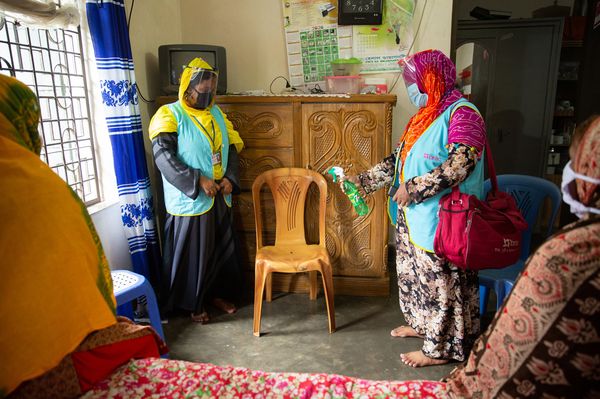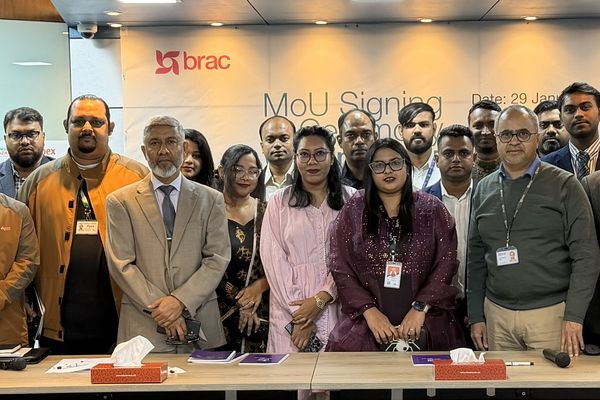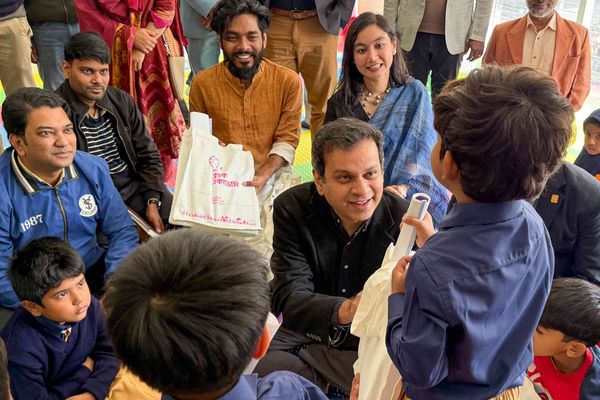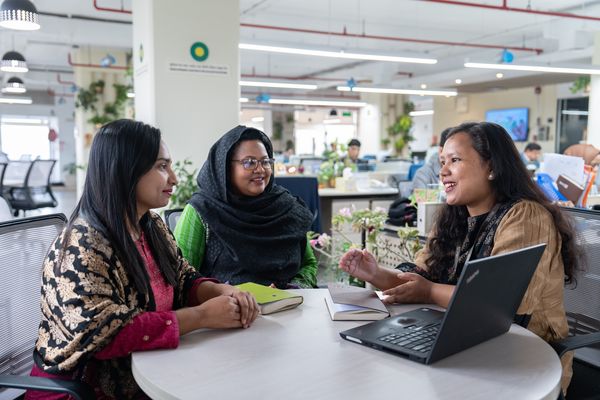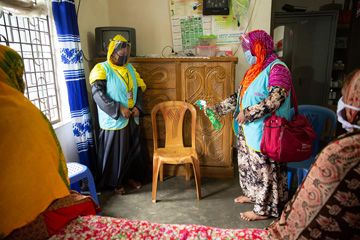
BRAC has taken up an initiative to support people living in the 38 high risk districts across Bangladesh. BRAC along with partner NGOs are all set to implement the plan through a community-driven COVID response and local level health system strengthening initiative. The decision was reached at an emergency meeting with the recently formed platform Civil Society Organisation (CSO) Alliance today on Thursday (15 April). The meeting decided that NGOs will collaboratively work across Bangladesh under an initiative styled ‘Community resilience to prevent coronavirus’ (করোনা প্রতিরোধে সামাজিক দূর্গ).
The emergency meeting was chaired by Civil Society Organisation (CSO) Alliance coordinator and advisor to former caretaker government Rasheda K Chowdhury. PRIP Trust executive director Aroma Dutta, Ahsania Mission ED Dr M Ehsanur Rahman, Hasin Jahan, Sultana Kamal, Maleka Banu, RDRS chairperson Shib Narayan Kairy and WaterAid regional director Khairul Islam also attended the meeting.
With this initiative, the NGOs together will work on spreading information on coronavirus prevention, proper use of masks and vaccine registration along with spreading awareness messages and addressing misinformation to around 58 million people living in the 38 high risk districts.
The high-risk districts with case positivity rate above 10 percent are: Dhaka, Chottogram, Rangamati Sylhet, Moulvibazar, Munshiganj, Narsingdi, Khulna, Narayanganj, Rajbari, Feni, Noakhali, Chandpur, Shariatpur, Laxmipur, Cumilla, Barisal, Rajshahi, Bogura, Narail, Nilphamari, Gazipur, Faridpur, Brahmanbaria, Jessore, Madaripur, Naogaon, Rangpur, Kishoreganj, Natore, Tangail, Pirojpur, Patuakhali, Bhola, Manikganj, Gaibandha, Dinajpur, and Mymensingh.
With the rising COVID cases, increasing number of deaths, overburdened hospitals and acute crisis in ICU facilities in Bangladesh, community level prevention with a central approach has become an emergency now.
On one hand the healthcare professionals are struggling to manage the influx of patients, while on the other people still remain mostly negligent towards following the preventive measures and healthcare guidelines. In this context a stronger focus on behavioural change and community engagement to prevent and manage COVID becomes inevitable.
About the initiative, BRAC executive director Asif Saleh said, “The fight against coronavirus prevention requires long-term initiative. It is not possible to win the fight without participation from communities. We are mobilising internal resources to initiate the programme and calling on donors and partners to come forward to scale it up. This low cost model will lead to long term benefits if it can get proper financing, and will also speed up the government’s coronavirus prevention efforts.”
BRAC in partnership with The Foreign, Commonwealth & Development Office (FCDO) of the Government of UK and under a joint initiative with the Directorate General of Health Services (DGHS) and Community Clinic Trust has piloted a community-driven COVID response and health system strengthening initiative in six districts over the past five months. Based on the success of the pilot, BRAC will scale this initiative across the 38 high risky districts identified by Institute of Epidemiology Disease Control and Research (IEDCR). BRAC will work together with partner organisations on the ground to slow down the spread of COVID-19, help flatten the curve and preserve health system capacity in these high risk districts. The initiative will have three key pillars of interventions: prevention, response to COVID case management, and promoting vaccination.
Prevention: BRAC and partners will ensure mask use, hand hygiene and social distancing through household education. Community groups will be engaged in awareness activities and rapid response. In addition, local government officials, volunteers and community leaders will be empowered with knowledge on COVID-19 related issues to ensure preventive behaviours at hotspots such as mosques, transport hubs, markets, shops, etc. Periodic assessment will be conducted to see behavioural change in the community. BRAC’s observation shows that decrease in mask use is directly related to an increase in COVID positivity rate. Hence, stronger focus needs on prevention.
Response: BRAC’s proven Community Support Team (CST ) model led by frontline community health workers will be scaled for syndromic surveillance at household level. These community based teams will identify suspected COVID-19 cases by visiting households with potential cases (identified via word of mouth approach) to conduct screening. Individuals matching with sets of clinical criteria will be connected to the telemedicine services for further support. These households will also receive information on home management of mild and moderate cases, possible referral points and testing facilities, quarantine protocols and best practices to prevent further spread of infection among the household members. Follow-ups will be conducted to ensure quarantine compliance.
Vaccination: BRAC and partners will support the local government health office for COVID-19 vaccination registration and mobilisation. BRAC’s 50,000 community health workers and volunteers will actively engage in addressing myths and rumors creating vaccine hesitancy at the community level. Furthermore, vaccination will also be promoted in each of the districts through local level miking and message dissemination via national TV, radio, newspaper and social media.
